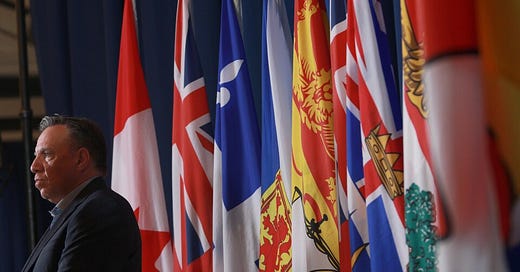Another assault on the Constitution, another day in Trudeau's dysfunctional Canada
Quebec Premier Francois Legault has added yet another building block to his ever-developing Sovereignty-Association project as theorized by this newsletter, with the recent passage of Bill 4, which permits elected Members of the National Assembly (MNAs) in Quebec to waive their obligation to swear an oath of allegiance to Canada's monarch, King Charles III, before taking their seats in the legislature.
Though Section 128 of the Constitution Act 1867 holds that all elected members of any provincial legislatures are required to take the oath, Bill 4 astonishingly declares that Quebec can unilaterally add a clause to the applicable section of the Canadian Constitution, excluding itself from this requirement.
Leaving aside where one might fall on the monarchy issue, the serious concern at hand is Quebec's ongoing belief it can amend the Canadian Constitution without Parliament and/or other provinces, as typically required in the constitutional amending formula.
While some constitutional experts have argued whether Quebec's ability to amend the Constitution as intended with Bill 4 falls under the Section 41 or Section 43 mechanism of the Constitution Act 1982, either way, it is clear Quebec cannot unilaterally amend as it contends in its legislation.
In response to Legault's unconstitutional manoeuvre, political scientist and constitutional scholar Emmett Macfarlane stated:
…the constitutional amending formula is not some mere technicality. It establishes the rules for who gets to change the most fundamental governing institutions, rules, and values of our society. The Constitution is higher law. To violate the amending formula is arguably the most dangerous rule of law infringement imaginable.”
Yet, Legault has been infringing on Canada's Constitution with impunity, as witnessed with both Bills 96 & 4, precisely because he knows he has a complicit partner, Prime Minister Justin Trudeau.
Though Trudeau has not weighed in on this latest endeavour from Quebec, his position on Legault's Bill 96; which similarly declared a unilateral ability to amend the Constitution in declaring Quebec a nation, French as its only official language, while simultaneously limiting English minority rights; was deemed perfectly legitimate in his view, and has likely given licence for Legault to proceed unabated with this current bill.
Both of Legault's bills deserve nothing less than to be subject to a judicial reference to the Supreme Court to rule on its constitutionality, yet Quebec is currently able to operate as though the Canadian Constitution does not apply, with passive affirmation reinforced by the Trudeau Liberals.
The case that is typically made to account for Trudeau's passivity in this regard is out of fear of political retaliation from Legault, who is popular in Quebec, while at the same time, practicing the long-standing federal approach not to be perceived as wrangling in the nationalist affairs of Quebec, all as a means of pandering for continued voting support in the province.
However, if Trudeau is to look for motivation, he needs only to look back at the last federal election campaign in 2021. Despite Legault having endorsed the previous Conservative leader Erin O'Toole during the campaign, while also accusing the Trudeau Liberals of being more interventionist, Quebecers did not heed Legault's recommendations, as the endorsement hardly had any real material impact on the Trudeau Liberals' vote share, which suggests there could be an invitation to be “interventionist” on this score, without it being as politically fatal in Quebec as it may seem, based on the inference from that electoral outcome.
If Trudeau were to look at a historical precedence to act, Prime Minister Jean Chretien had put a reference question to the Supreme Court shortly following the 1995 Quebec Referendum, to establish the conditions upon which Quebec may be able to secede from the federation in any future referendum. Once the Supreme Court ruling determined the need for a “clear vote on a clear question,” Chretien moved quickly to enshrine this understanding into federal law with the Clarity Act. Though the Clarity Act provoked tremendous opposition from within the ranks of the Quebec government, with renewed threats of separation, ultimately Chretien pursued what was right in the interest of Canadian unity, irrespective of inflaming tensions with the province and any perceived political costs in doing so.
While much of Canada’s unity has been maintained over the years mostly through the flexibility exhibited with “asymmetrical federalism,” by permitting different jurisdictions to pursue policies unique to their own respective province or territory, it is evident Legault's initiatives are simply stretching the boundaries of that concept beyond its original intention, and moving rapidly towards a sovereignty-based approach.
And so whether it is Legault's ongoing constitutional assaults towards de facto sovereignty, or even Alberta Premier Danielle Smith's blatantly unconstitutional Sovereignty Act, this regional fracturing is becoming commonplace in Trudeau's Canada.
On the face of such challenges, Canadians expect their Prime Minister to be courageous, with a mind towards national unity, and an ardent defence for the constitutional order. Anything short of this expectation is a dereliction of duty, and such unwillingness to uphold Canada's Constitution should warrant immediate calls for Trudeau's resignation, rather than what has become tacit acceptance for routine unconstitutionality.




